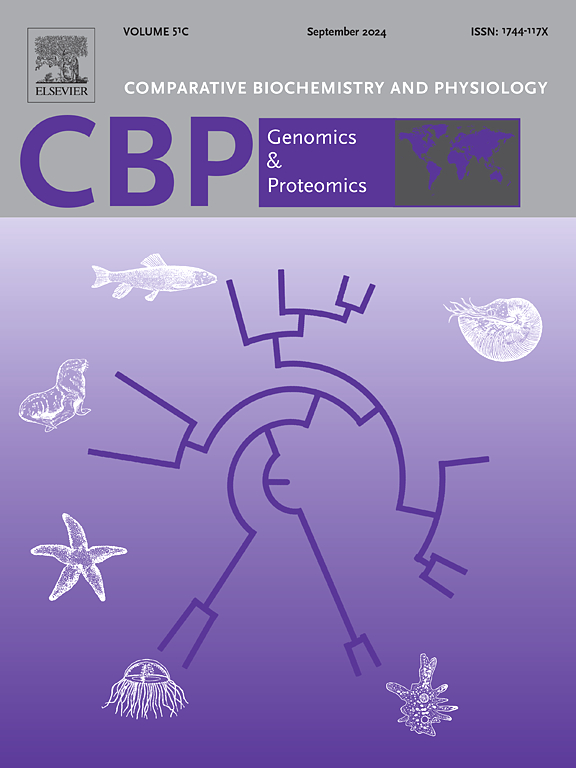Transcriptome analysis reveals molecular mechanism of Dosinia corrugata in response to acute heat stress
IF 2.2
2区 生物学
Q4 BIOCHEMISTRY & MOLECULAR BIOLOGY
Comparative Biochemistry and Physiology D-Genomics & Proteomics
Pub Date : 2025-01-24
DOI:10.1016/j.cbd.2025.101426
引用次数: 0
Abstract
This study seeks to explore the molecular regulatory mechanism within Dosinia corrugata in response to extreme high-temperature conditions, aiming to enhance the sustainable development of the D. corrugata aquaculture industry. To identify heat-responsive genes and elucidate adaptive mechanisms, we conducted transcriptional profiling of D. corrugata gills after 12 h and 24 h of acute heat stress. At 12 h and 24 h under acute heat stress, we detected 6842 and 1112 differentially expressed genes (DEGs), respectively. KEGG (Kyoto Encyclopedia of Genes and Genomes) enrichment analysis revealed that co-enriched pathways at both time points included Apoptosis-multiple species, Ubiquitin-mediated proteolysis, Tumor Necrosis Factor (TNF) signaling pathway, and Retinoic acid-inducible Gene I (RIG-I)-like receptor signaling pathway in response to acute heat stress. It is noteworthy that at 12 h of acute heat stress, metabolic pathways were significantly enriched, while at 24 h, immune-related pathways showed significant enrichment. Based on the co-enrichment pathways identified at both time points during acute heat stress (12 h and 24 h), we constructed a potential regulatory network for differentially expressed genes under heat stress. This study offers valuable insights into comprehending the potential molecular regulatory mechanisms that underlie D. corrugata's response to elevated temperatures.

本研究旨在探索冠突伪尾柱虫在极端高温条件下的分子调控机制,以促进冠突伪尾柱虫水产养殖业的可持续发展。为了鉴定热响应基因并阐明适应机制,我们对急性热胁迫12小时和24小时后的皱纹盘鲍鳃进行了转录谱分析。在急性热胁迫12小时和24小时后,我们分别检测到了6842个和1112个差异表达基因(DEGs)。KEGG(京都基因和基因组百科全书)富集分析表明,两个时间点的共同富集通路包括凋亡-多物种、泛素介导的蛋白水解、肿瘤坏死因子(TNF)信号通路和类视黄酸诱导基因 I(RIG-I)受体信号通路。值得注意的是,在急性热应激12小时时,代谢通路显著富集,而在24小时时,免疫相关通路显著富集。根据急性热应激期间两个时间点(12 小时和 24 小时)发现的共富集通路,我们构建了热应激下差异表达基因的潜在调控网络。这项研究为了解 D. corrugata 对高温反应的潜在分子调控机制提供了宝贵的见解。
本文章由计算机程序翻译,如有差异,请以英文原文为准。
求助全文
约1分钟内获得全文
求助全文
来源期刊
CiteScore
5.10
自引率
3.30%
发文量
69
审稿时长
33 days
期刊介绍:
Comparative Biochemistry & Physiology (CBP) publishes papers in comparative, environmental and evolutionary physiology.
Part D: Genomics and Proteomics (CBPD), focuses on “omics” approaches to physiology, including comparative and functional genomics, metagenomics, transcriptomics, proteomics, metabolomics, and lipidomics. Most studies employ “omics” and/or system biology to test specific hypotheses about molecular and biochemical mechanisms underlying physiological responses to the environment. We encourage papers that address fundamental questions in comparative physiology and biochemistry rather than studies with a focus that is purely technical, methodological or descriptive in nature.

 求助内容:
求助内容: 应助结果提醒方式:
应助结果提醒方式:


